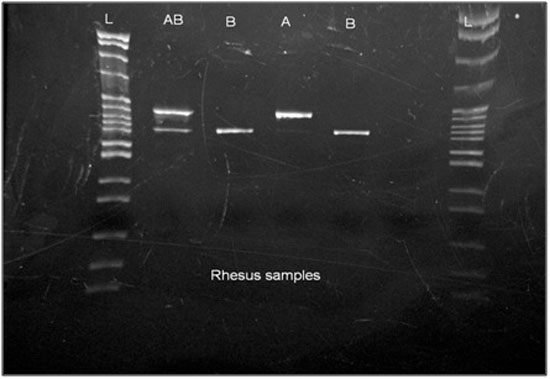Genetic Testing Services
ABO Phenotyping
Stem-cell and transplantation studies are rapidly expanding areas of biomedical research that require knowledge of selected blood types including the ABO cell surface antigen phenotypes of both the donor and recipient to prevent fatal immunological reactions during transplantation and stem cell treatment. The increasingly frequent use of rhesus and cynomolgus macaques, who commonly exhibit the A, B and AB blood group phenotypes, as subjects in studies involving transplantation requires that blood and other tissue antigens of donors and recipients be compatible.
Currently, the methods for ABO blood typing of rhesus and cynomolgus macaque samples consist of 1) reverse typing agglutination tests of surface antigens on human red blood test cells and corresponding naturally occurring serum antibodies in macaques and 2) the saliva inhibition test (SIT). Reverse typing of macaque serum or plasma, that, as in humans, contains naturally occurring antibodies corresponding to the ABO antigens, can only provide reliable results using human test RBCs expressing the A and B antigens if the macaque sera are first absorbed with human type O red blood cells (RBCs) to remove species specific agglutinins that can cause false positive results. In NHPs, the A, B and O (H) antigens are absent from RBCs, precluding forward typing of their ABO phenotypes, but are found in secretions such as saliva and epithelial cells. Because the secretor gene is fixed in macaques, phenotypes can always be identified using the saliva inhibition test (SIT). However, both of these serological tests are time consuming, often yield ambiguous results, do not identify the mutations responsible for the phenotypes and are subject to multiple typing errors.
We developed a multiplex polymerase chain reaction (PCR) method based on sequence-specific priming (SSP) to determine the ABO blood types of rhesus macaques using DNA samples by the identification of mutations responsible for the A and B antigens. The O phenotype, while potentially useful as a universal donor, is moot for transplantation research in macaques owing to its rarity in macaques and the recessive condition of the O allele in heterozygotes.
We designed primers to target the SNPs in exon 7 of the ABO locus specific to the A and B antigens. The forward primer 5’_ TGGACGTGGACATGGAGTTCCGT defining the A allele begins and ends at two T→C SNPs unique to the A allele [nucleotide positions (nps) 5367901 and 536923] while that defining the B allele, 5’_GGAGATCCTGACTCCGCTCTT, encompasses the G→A and C→G SNPs (nps 5367953 and 5367956, respectively) unique to the B allele and anneals to np 5367938 in exon 7. A reverse primer (AB reverse primer), 5’_ CCCTGGTGAGCCGCTGCACCTCC, was designed from a region further downstream at np 5368120 in exon 7.
As such, the A and B allele primers described here target a region approximately 166 and 129 bases upstream, respectively, from nucleotide sequences which correspond to A and B specific amino acid residues 266 and 268. The forward primer for the A and B alleles generate a fragment of 219 and 182 bp long, respectively, with the common ABO reverse primer. Animals assigned the AB (heterozygous) phenotype exhibited two bands, each one representing 219 and 182 bp fragments as illustrated below.

Our report to you identifies the ABO blood group phenotype of each animal whose sample you send us.
Premasuthan A, DG Smith, JA Satkoski Trask and S Kanthaswamy. 2011. A Simple Multiplex PCR to Determine ABO Blood Types of Rhesus Macaques (Macaca mulatta). Tissue Antigens doi: 10.1111/j.1399-0039.2010.01602.x.
